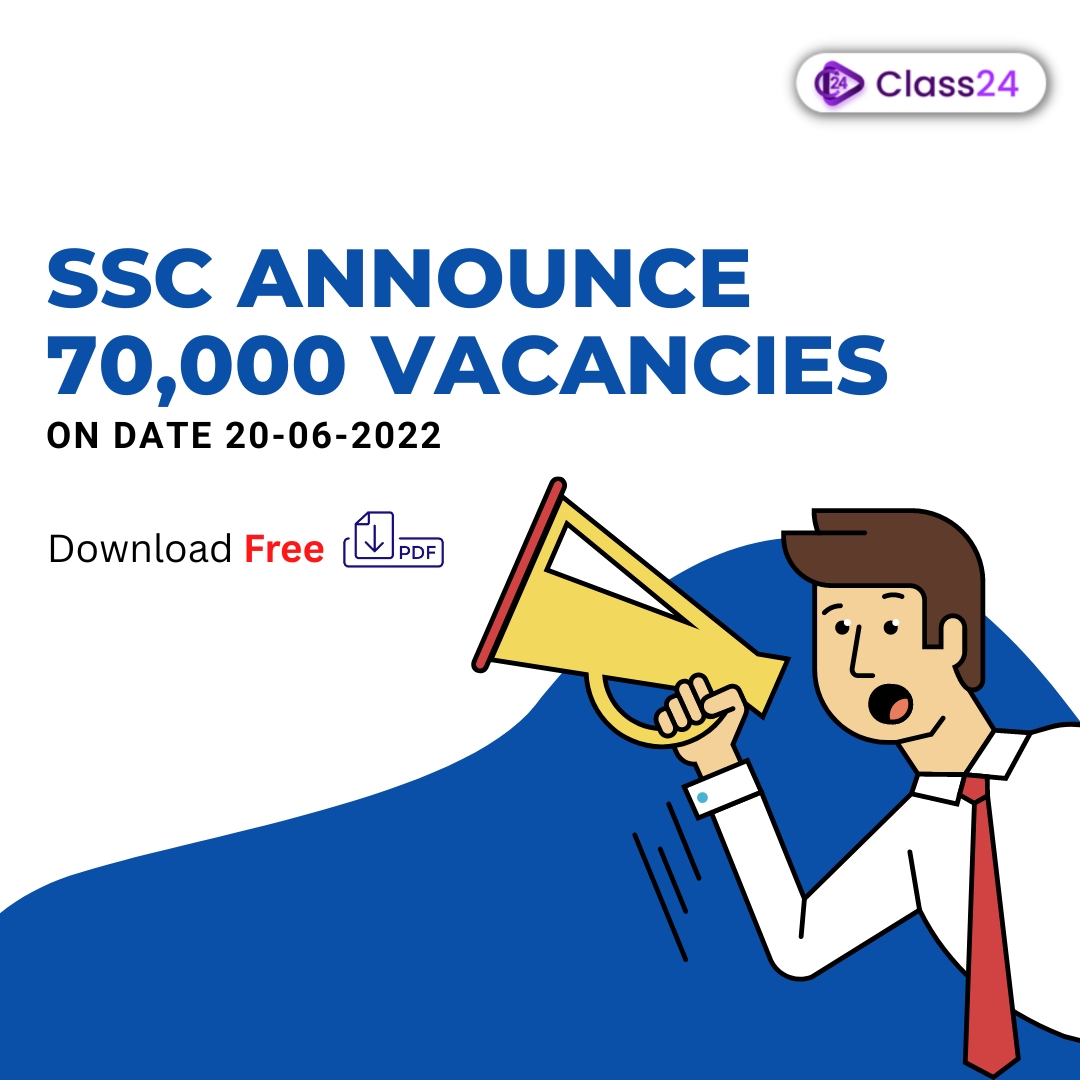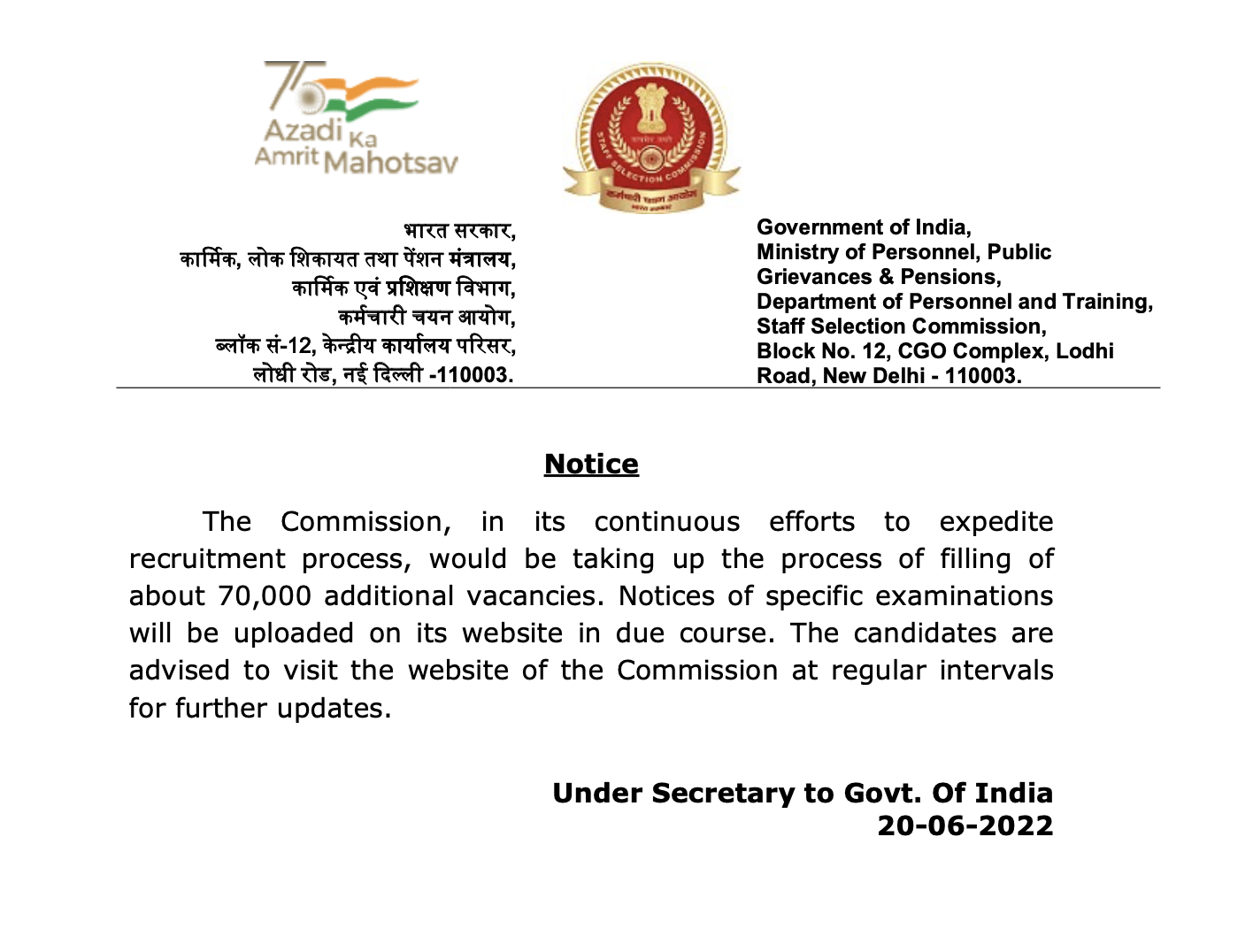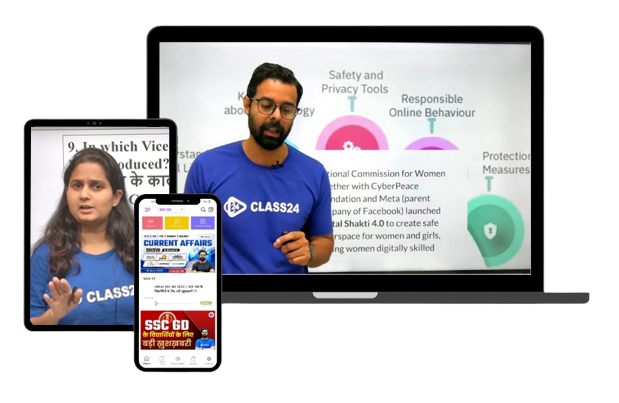SSC announce 70,000 vacancies on date 20-06-2022

Govt. 20- Government of India, Ministry of Personnel,Public Grievances & Pensions,
Department of Personnel and Training,Staff Selection Commission,
Block No. 12, CGO Complex, Lodhi Road, New Delhi - 110003
The Commission, in its continuous efforts to expedite recruitment process, would be t about 70,000 additional will be uploaded on its website in due course. advised to visit the website of the Commission at regular intervals for further updates.
SSC Announces 70000 vacancies: Great news for aspirants of government exams. SSC in its latest notification released on 20th June 2022 has announced that it will be releasing 70000 additional vacancies in the coming days to fill up positions in various departments.
In this blog given by Class24, we will be looking at this new notification released by SSC and what is SSC all about.
With all the exciting job opportunities in the government sector coming up, candidates should gear up as the competition is going to be tough and those with the right preparation and strategy will make the final selection.
Give your government job dream the best possible chance of success with the right study materials and mock tests.
Under Secretary to Govt. Of India 20-06-2022
Download the PDF of the announcement
ent.

About - SSC CGL - Staff Selection Commission - Combined Graduate Level Examination
SSC or Staff Selection Commission is considered the most sought organization that conducts Government examinations in India. Every year the commission conducts the Combined Graduate Level Examination to recruit candidates to the posts in non-technical Group B, and C non gazetted posts across different ministries, departments, organizations in the GOI.
The SSC-CGL Examination welcomes candidates for the recruitment of different subordinate services, which include:
• Inspectors of Central Excise & Customs.
• Examiner in Customs.
• Assistants in Ministries/Departments, Attached and Subordinate office of the Govt. Of India.
• Inspectors of Income Tax.
• Sub-Inspectors in Central Bureau of Narcotics & CBI.
• Preventive Officers in Customs.
• Divisional Accountant, Jr. Accountant, Auditor & udcs in various offices of Govt. Of India.
• Assistant Enforcement Officer in Directorate of Enforcement, Department of Revenue.
• Accountant/ Junior Accountant
• Tax Assistant in CBDT and CBEC
• Auditor Offices under C&AG, CGDA, CGA & others.
• Compile
Eligibility Criteria
Age Limit
Candidates applying for the SSC CGL Examination should have completed 18 years of age and must not be older to 32 years of age.
The lower age and upper age limit for the Examination tends to vary based on each post.
The candidate's age mentioned in the 10th and 12th Certificates will be considered for the Examination.
Educational Qualifications
For the Assistant Audit Officer/ Assistant Accounts Officer post, candidates applying for the position must have qualified their bachelor's degree or equivalent Examination from a recognized institute or university. Some of the desirable qualifications include:
Chartered Accountants or
Cost Management Accountant or
Company Secretary or
Masters in Business Studies or
Masters in Commerce or
Masters in Business Administration in Finance or
Masters in Business Economics
For Junior Statistical Officer
Candidates seeking recruitment to the post of Junior Statistical Officer must have a qualified bachelor's degree in any subject passed from a recognized institute or university with at least 60% of marks in the subject of Mathematics in Std 12th level.
Or must hold a qualified bachelor's degree in any subject and statistics as a subject at the degree level.
For Statistical Investigator Grade II
Candidates must qualify for their bachelor's degree in any subject with Statistics as a subject from a recognized institute or a university. Besides, the candidates must have qualified for the subject in statistics through the three years of the graduation program.
For Other Posts
Candidates must hold a qualified bachelors or equivalent degree from a recognized university.
Exam Pattern
Tier-1 Exam Pattern
(Table)
There will be a penalty for wrong answers. Candidates would be given a negative marking of 0.50 marks for every wrong answer. However, there will be no sectional cut-off. Besides, no marks will be cut for answers that are left unattempted or unresponded by candidates.
Tier-2 Exam Pattern
The negative score for the wrong answer: There will be a negative marking for the wrong answer with a deduction of 0.25 marks. However, there will be no sectional cut-off, and no points will be reduced if the question is left unattempted or unresponded.
Tier-3 Exam Pattern
The Tier 3 of the SSC CGL Examination will be a descriptive type of test. The paper will be either in English or Hindi language with a total score of 100 marks. The total duration of the Examination will be 60 minutes or 1 hour.
(Table)
Tier-4 Exam Pattern
The Tier 4 of the SSC CGL Examination will be Computer Skill Test which will be conducted in two steps which include:
DEST Test
CPT Test
DEST: In the DEST Test, candidates will be tested on their skill of English on computer. Students will have to type around 2000 words on the computer for 15 minutes. Herein, candidates will be assessed on their writing skills.
CPT: The candidates will be assessed on their Word Processing and Spreadsheet check in the CPT Exam.
Exam Syllabus
SYLLABUS: TIER I
QUANTITATIVE APTITUDE SYLLABUS
The Quantitative Aptitude Questions are designed to assess the student's ability to use number and their sense of it. They will be evaluated on their scope of computing whole numbers, fractions, decimals, profit and loss, Fractions and Relationships between numbers, partnership business, time and distance, and much more.
GENERAL INTELLIGENCE AND REASONING SYLLABUS
The General Intelligence and Reasoning test will include questions surrounding non-verbal and verbal types. These include topics like Similarities and Differences, Analogies, Space Visualization, Problem Solving, Decision Making, Analysis Judgement, Discrimination, Visual Memory, Observation, Arithmetical Reasoning, and Figural Classification, Relationship Concepts, Non-Verbal Series, Arithmetic Number Series, Coding and Decoding, Syllogistic Reasoning, Statement Conclusion, etc.
The topics include:
The topics are semantic analogy, symbolic/ number analogy, figural analogy, semantic classification, symbolic/ number classification, figural classification, semantic series, number series, figural series, problem-solving, word building, coding & de-coding, numerical operations, symbolic operations, trends, space orientation, space.
SYLLABUS: TIER 2
Paper-i (quantitative abilities) syllabus:
Tier 2 of ssc cgl comprises questions that will assess the ability of candidates surrounding the use of number and number sense. The scope of the exam will include whole computing numbers, the relationship between fractions and numbers, decimals, ratio & proportion, percentage. Other topics include averages, square roots, profit and loss, interest, partnership business, time and distance, ratio & proportion, discount, time & work mixture and allegation, circle, triangle, basic algebra, and algebraic terms, elementary surds, triangle, and centres, circle and chords, congruence and similarity of triangles, quadrilaterals, right prism, tangents, angles subtended by chords, regular polygons, common tangents between two or more circles, right circular cone and cylinder, hemispheres, sphere, a regular right pyramid with square or triangular base, rectangular parallelepiped, standard identities, trigonometric ratio, standard entities, degree and radian measures, heights and distances, complementary angles, frequency polygon, histogram, pie chart, and bar diagram.
Paper-ii (english language and comprehension) syllabus:
Candidates in paper ii will be assessed on their ability to understand english and knowledge surrounding its usage. Questions will include spotting the error, synonyms & antonyms, fill in the blanks, idioms & phrases, detecting misspelled words, spelling error, active & passive voice of verbs, converting sentences from direct to indirect/ vice-versa narration, shuffling sentences in the passage, and sentence parts, closing passage, and comprehension.
Paper-iii (statistics) syllabus:
Paper iii of the tier ii exam of ssc cgl will cover topics related to statistics. Below is a gist of the syllabus.
1. Classifying statistical data into primary and secondary, different data collection methods, graphs and charts, collection of data, distribution of frequency, a tabulated form of data diagrammatic representation of frequency distribution.
2. Measures of central tendency - common measures; partition values – percentiles, quartiles, and deciles; mean, median & mode
3. Measures of dispersion – common measures, range, mean and standard deviation, quartile deviation, measuring relative dispersion.
4. Skewness, moments, and kurtosis – types of moments and relationship, what is kurtosis and skewness, measures of skewness, measures of kurtosis.
5. Regression and correlation – simple correlation coefficient, scatter diagram, spearman’s rank correlation, simple regression lines, measuring attributes, multiple and partial corrections (using three variables), multiple regression.
6. Probability – meaning, different definitions, conditional and compound probability, bayes theorem, independent events.
7. Random variable & probability distributions – probability functions, random variable, variance and expectation of random variable, higher moments of a random variable, exponential and normal distributions, binomial, the joint distribution of two random variables (discrete)
8. Sampling – population and sampling, statistic and parameter, errors in sampling and non-sampling, techniques of probability and non-probability sampling (simple, stratified, multistage, multiphase, cluster, systematic, systematic, purposive, convenience, and quota sampling), sampling distributions (only statements) and sample size decisions.
9. Statistical inference – point and interval estimation, properties of the estimator, methods (moments, maximum likelihood, least squares method). Testing of hypothesis, small and large sample tests, basic concepts, tests based on t, f, z, chi-square statistic, confidence intervals.
10. Variance analysis – analyse one-way and two-way classified data
11. Time-series analysis – components, determination of trend component using different methods, measure seasonal variations and its methods.
12. Index numbers – meaning, problems in constructing index numbers, types, formulae, splicing and base shifting of index numbers, cost of living, and its uses
Paper-Iv (General Studies-Finance And Economics):
Part A: Finance And Accounts-(80 Marks):
Fundamental Principles & Basic Accounting Concepts:
1.1 Financial Accounting: Nature & Scope, Limitations, Basic Concepts & Conventions, Accounting Principles
1.2 Basic Accounting Concepts: Single & Double Entry, Bank Reconciliation, Trial Balance, Books Of Original Entry, Ledgers, Errors & Rectification, Profit & Loss, Manufacturing, Appropriation Accounts, Balance Sheet And The Difference Between Revenue And Capital Expenditure, Inventory Valuation, Depreciation Accounting, Non-Profit Organisation Accounts, Bills Of Exchange, Receipts & Payments, Income & Expenditure Accounts, Self-Balancing Ledgers.
Part B: Economics And Governance-(120 Marks):
2.1 Comptroller & Auditor General Of India- Constitutional Provisions, Role, And Responsibility.
2.2 Finance Commission-Role And Functions.
2.3 Basic Economic Concepts: Introduction To Micros Economics, Definition, Study Methods, Definition, Scope And Nature, Central Problems Of An Economy, And Production Curve.
2.4 Demand & Supply Theory: Meaning And Determinants, The Law Of Demand & Elasticity Of Demand, Income Elasticity, Cross Elasticity, Price, Consumer Behavior, Marshallian Approach, Determinants Of Supply, Law, And Elasticity Of Supply, Indifference Curve Approach.
2.5 Cost And Production Theory: Meaning, Factors, Laws Of Production, The Law Of Returns Of Scale, Law Of Variable Proportions.
2.6 different market forms, price determination in different markets, forms of markets-perfect competition, monopolistic competition, monopoly, oligopoly, price determination in these markets.
2.7 Indian Economy:
2.7.1 Nature and Role Of Different Sectors, Agriculture, Services, And Industries – Problems and Growth
2.7.2 National Income Of India, Concepts, Different Methods Used For Measuring National Income.
2.7.3 Population, Size, Growth Rate, Implication On Economic Growth.
2.7.4 Unemployment & Poverty – Relative & Absolute Poverty, Causes, Types, And Incidence Of Unemployment.
2.7.5 Infrastructure – Transportation, Energy, Communication.
2.8 Indian Economic Reforms: Reforms Since 1991; Privatisation, Liberalisation, Globalisation & Disinvestment.
2.9 Money And Banking:
2.9.1 Fiscal & Monetary Policy: Role And Function Of Rbi, Functions Of Rrb, Commercial And Payment Banks
2.9.2 Budget & Balance Of Payments, Fiscal Deficit.
2.9.3. Role Of Information Technology In Governance.
2.10 Fiscal Responsibility And Budget Management Act, 2003
Note: The Paper I Questions Will Be Matriculation Level While Paper Ii Will Be 10+ 2 Levels. Paper Iii And Paper Iv Will Be Of Graduation Level.
SSC CGL TIER-III SYLLABUS
The Tier III of the Syllabus will be descriptive and assess the writing skills in either Hindi or English. The Examination will be conducted in the offline mode or Pen and Paper Mode. In addition, students must write Applications, Letters, Essays, Precis, etc. Besides, the Examination will include 100 marks, and the duration will be 1 hour or 60 minutes. However, the time allocated for candidates in the pwd category will be 80 minutes. The Tier III paper is attempted by students who want to recruit for Statistical Investigator Grade-II and Compiler posts.
SSC CGL TIER-IV SYLLABUS
The Tier IV of the Examination will include assessing the skillsets for recruitment of candidates to certain posts of GOI across the country.
DEST (DATA ENTRY SPEED TEST): Candidates applying for the post of Tax Assistant in the Central Excise and Income Tax Department must sit for the DEST exam to assess the applicant's typing speed. The candidates must type the English language article comprising over 2000 words on the computer within 15 minutes.
CPT (COMPUTER PROFICIENCY TEST): Candidates will be assessed the skill of word processing, spreadsheets, and generating slides which are the three modules for the exam. Besides, candidates must be proficient in the skill for the post of MEA, CSS, inspector (examiner), inspector of central excise, and inspector of the preventive officer.
Tier-I exam is compulsory for all posts mentioned in the SSC CGL 2020 notification. Therefore, candidates will have to prepare for both tier 2 and tier 3 exam simultaneously. However, the evaluation of the tier 3 descriptive exam will be done only if a candidate clears the combined cut-off for tier 1 and tier 2. So, candidates may appear for both tier 2 and tier 3 exams, but your tier 3 answer sheets will be evaluated only if they clear the cut-off. Tier-iv exam is taken by candidates applying specifically for TA, CSS, MEA, and inspector.
Penalty for wrong answers
Giving a wrong answer to a question will lead to a deduction of 0.5 marks in tiers – i, iii, and iv while that of 0.25 marks in tier-ii.
Let's connect with CLASS24
🚀 Download the Class24 App here:
🚀 Telegram Link:
👉 https://t.me/sciencewithshiprachauhan
🚀 Facebook Link:
👉 https://www.facebook.com/Class24-106038155412617
🚀 Instagram Link:
👉 https://www.instagram.com/class24official/
🚀 Twitter Link:
🚀 YouTube Link:




